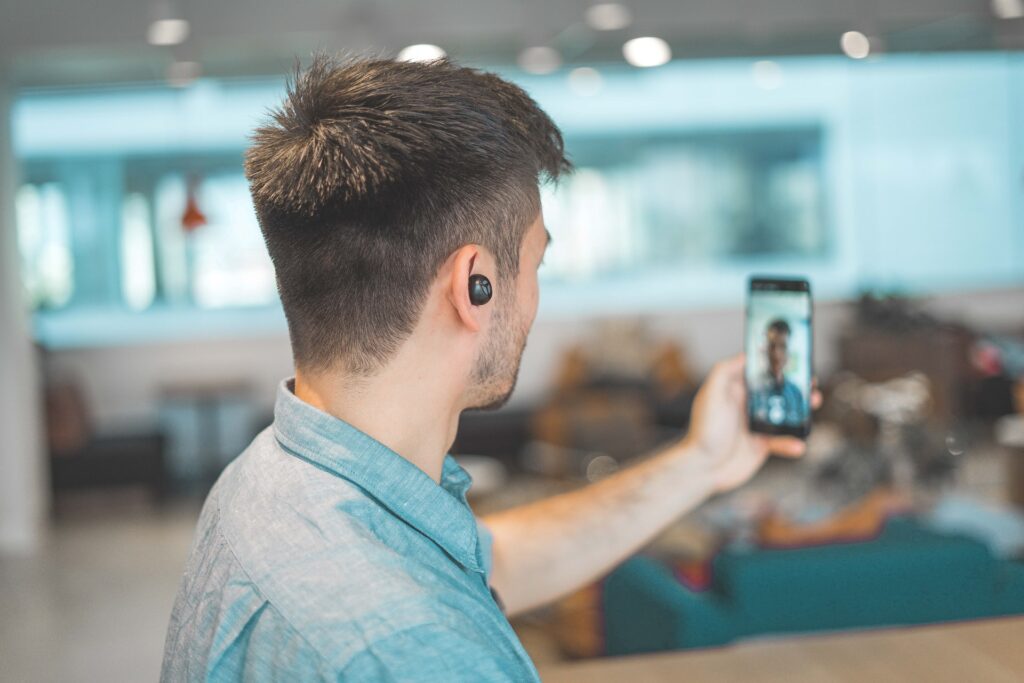The COVID-19 pandemic made work from home the new way of working, which many found satisfying. But not everyone delighted in it. In Singapore, a Qualtrics study conducted in 2020 revealed that a quarter of employees had experienced a decline in mental wellbeing as a result of stress. Of this number, 7% was attributed to fatigue and 6% to work-from-home arrangements.
Once reserved for distant or intimate conversations, video calls have become synonymous with the home office. From interviews, meetings, and discussions to team bonding and social activities, it kept things running and kept us connected.
Video calls might have made working from home a possibility, but their excessive use has taken a toll on our mental wellness, giving rise to Zoom fatigue. But more than just exhaustion, video calls affect us emotionally too. And if you have ever felt nervous before a video call, afraid to speak up when videoconferencing, or left out of the conversation, you might be dealing with Zoom anxiety.
According to behavioural health coach Suprita Sinha, “Zoom anxiety” stems from the thought that you are being watched or judged negatively. Here are four reasons why video calls make us anxious.

1. The lack of nonverbal cues
As humans, we rely a lot on nonverbal cues in communication.
They come naturally to us and help us understand one another efficiently. For example, you may read the room and sense that everyone is bored during a meeting. Or you may make eye contact with a colleague to indicate it’s time for a coffee break.
In a video call, we cannot tell how attendees are doing or feeling. Do they understand what we’re saying? Are they engaged? Do they need a break?

Sometimes, we misread the lags in transmission for an awkward silence. Other times, we talk over one another when we do not know who has something to say. Some may dominate the conversation, and others may feel left out when their voices literally go unheard. Not being able to make sense of the situation causes uncertainty to creep in, leaving us self-conscious and anxious.
2. We pay attention to ourselves more than we need to
In video calls, we do not just see others—we are subjected to our own gaze too. We start to scrutinise our physical appearances and how we carry ourselves with great details, and things we have never before noticed quickly become bugbears. Research has shown that self-focused attention makes us more susceptible to negative effects associated with anxiety and depression, leading to what they call “mirror anxiety.”
Harvard Medical School professor and Dermatologist, Dr Shadi Kourosh, likened the cameras in video calls to a “Funhouse Mirror”, because it is a distorted mirror, so people do not see a true reflection of themselves. To make matters worse, video calls also make us feel like we are being watched and judged by fellow participants.

Suprita added that millions of people have had to deal with “Zoom dysmorphia” during the pandemic. The constant preoccupation with the minor imperfections in one’s appearances by looking at themselves on camera all day exacerbates their feelings of dissatisfaction.
“Cognitive-behavioural models of body dysmorphic disorder suggest that mirrors can be a trigger for individuals, causing them to be obsessed with how they look,” explains Suprita. “The increase in self-focused attention brings along with it the associated distress.”
3. Video calls make us feel trapped
To stay within sight in a video call, we end up “trapping” ourselves in window. During in-person meetings, it is normal to grab another cup of coffee, taking notes, or letting one’s line of sight wander to diffuse the tension in the air.
In virtual settings, however, we refrain from moving unnecessarily for fear that it might distract others, call more attention to ourselves, or appear uninterested. We consider it our duty to be “seen”, keeping our bodies still and our eyes glued to the screen. It’s like we’re stuck in an invisible box, restricting our movement in unnatural ways.

The fact the our faces are splashed across the computer screen also causes unease. Jeremy Bailenson, a communications professor from Stanford, noted that this simulates an intimate interaction typically reserved for our loved ones, making it too close for comfort. Since we have nowhere to run, it puts our brains in a hyper-aroused state, preparing our bodies to fight or flight.
4. Video calls require us to multitask
In addition to fulfilling tasks over video calls, we are also required to be our own IT department.
In a survey of over 2,000 home workers, “having tech/audio problems and not knowing how to fix them” was the top trigger of video call anxiety. Such issues would be easily solved by the IT department, but when it is left entirely to us, our lack of knowledge and experience makes this a huge struggle for us.
On top of feeling incompetent, there is also the stress and worry of holding up fellow participants.
Although video platforms are generally user-friendly, we have to remain vigilant at all times to avoid potentially embarrassing situations. That includes turning our camera off when a family member enters the room and unmuting our microphones while talking to them. Or, reminding yourself to share the right screen lest everyone in the organisation knows what you’ve been watching on Netflix.
Overcoming video call anxiety
Sometimes, the more we try to avoid such situations, the more our anxiety festers and disrupts our work. Since video calls are the new norm, we have to recognise the symptoms of Zoom fatigue and address them accordingly. Suprita shares six tips for doing so.
1. Stay present
Staying grounded compensates for the lack of non-verbal cues. By focusing on the meeting, asking questions, or repeating yourself, you get a clearer picture of what is going on and are less likely to ruminate.
The moment your attention drifts to a negative thought, gently redirect it to what is happening at the moment. A quick and easy way is to take a slow, deep breath, thinking “In” and “Out” with each breath.

When it comes to negative self-talk, try a more compassionate tone by saying, “You are trying hard and you are doing your best.” You can also interrupt the inner critic with this 5-4-3-2-1 coping technique.
2. Check your bias
For evolutionary purposes, we learn and register negative experiences more readily than positive experiences. Neuropsychologist and expert in neuroplasticity Dr Rick Hanson explains that “our brains are like Velcro for negative experiences and Teflon for positive experiences,” causing us to pay more attention to the negative events in our lives.
To overcome negative bias, pay attention to your thoughts. When a judgmental voice goes “I shouldn’t have said that” or “I must have sounded stupid”, redirect your attention to positive aspects you might be missing. For all you know, you might recall a coworker’s reassuring nod during your presentation, or a text message that said “good work!” in the chat.
3. Take a breaks
Excessive screen time strains your eyes, body, and mind. Whenever you need to, give yourself permission to take a break.

Excuse yourself to get that coffee, do a quick stretch, and move your body mindfully. By turning the camera off momentarily, you can give your eyes a well-deserved break or adjust your posture to find a more comfortable position.
4. Adjust settings
To minimise mirror anxiety, adjust your Zoom settings to hide self-view. If it’s possible, switch off the camera and leave your microphone on. If you feel anxious about being seen up close, you can switch to the speaker mode when presenting. Getting familiar with the platform your team uses also allow you to practise before important calls so you can operate it confidently in any situation.
5. Speak up
When anxiety becomes too overwhelming, consider letting your boss know how you feel.
For instance, if discussions are often dominated by a few people talking over the rest, your supervisor might choose to invite individuals in turn to share their thoughts.
You can also suggest incorporating more breaks, ensuring sufficient time to prepare for presentations, allowing cameras to be turned off periodically, or even considering sending emails or using audio calls instead.
How Intellect can help
Although anxiety is a natural human response to stress, prolonged or excessive anxiety can potentially result in mental and physical health issues.
Suprita from Intellect highlights that physical manifestations of stress in the body, such as tension, an elevated heartbeat, shortness of breath, dizziness, and stomach pain, are indicators that you might be grappling with anxiety.
“At this stage, it is important to seek professional support from psychologists, counsellors, coaches, and therapists,” she advises.
Learn more about how you can do so at Intellect’s clinics.






